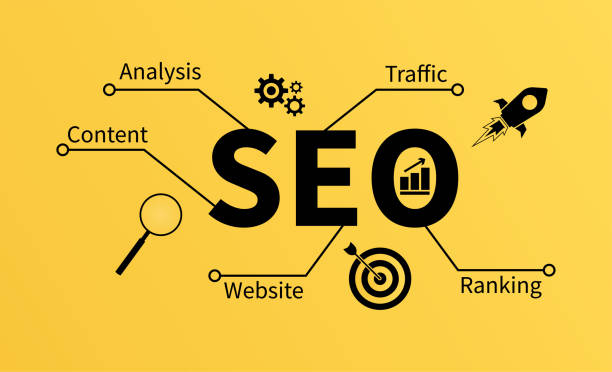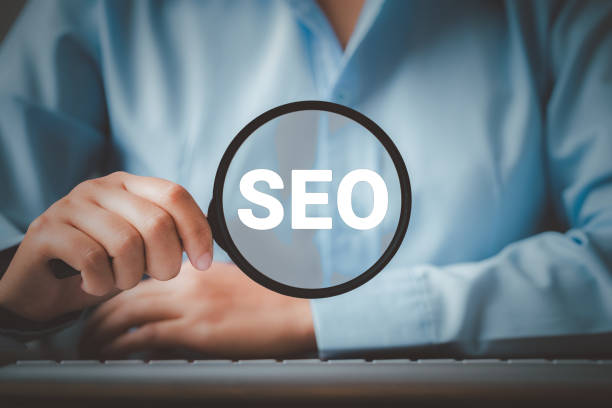What is SEO and why is it important

What is SEO and why is it important
#SEO, or Search Engine Optimization (SEO), is the process of improving the visibility of a website or a web page in the unpaid (organic) search results of search engines like Google, Bing, and Yahoo.
This process includes a set of techniques and strategies that help websites rank higher in search results.
The importance of SEO in today’s digital world is immense.
With increasing internet usage for searching information, products, and services, presence in top search results can significantly increase website traffic.
This traffic can lead to increased sales, brand recognition, and audience engagement.
In other words, SEO is a powerful tool for online marketing and business growth.
The main reasons for SEO’s importance include:
- Increased Organic Traffic: Organic traffic refers to traffic that comes to your website through unpaid search results.
This type of traffic is usually higher quality because users who reach your website through search are looking for information, products, or services that you offer. - Improved Website Credibility: Websites that rank high in search results are generally considered more credible and trustworthy.
This can help improve your brand image and increase customer trust. - Reduced Marketing Costs: Compared to paid marketing methods like pay-per-click advertising, SEO can be a more cost-effective way to attract traffic to your website.
- Access to Target Audience: By using SEO, you can optimize your website for specific keywords that your target audience searches for.
This helps you attract more relevant traffic to your website.
Did you know that 94% of users’ first impressions of a business are related to its website design? Transform this first impression into an opportunity for growth with professional corporate website design by **Rasaweb**.
✅ Attract more customers and increase sales
✅ Build credibility and trust in the eyes of your audience⚡ Get a free website design consultation!
Keyword Research Principles and Tools

Keyword Research Principles and Tools
Keyword Research (Keyword Research) is one of the most important stages in the SEO process.
The goal of keyword research is to identify the words and phrases that your target audience uses in search engines to find information, products, or services related to your business.
By identifying these keywords, you can optimize your website for them and achieve higher rankings in search results.
The principles of keyword research include:
- Understanding the Target Audience: Before starting keyword research, you need to have a complete understanding of your target audience.
What information do they need? What problems do they have? What language do they use? - Brainstorming: Create a list of words and phrases related to your business.
Think about the words your target audience might use to find you. - Using Keyword Research Tools: Use various tools to find relevant keywords, their search volume, and their competition level.
Some popular keyword research tools include: Google Keyword Planner, Ahrefs, SEMrush, and Moz Keyword Explorer. - Competitor Analysis: Analyze the keywords your competitors have optimized for.
This can give you new ideas for keywords. - Choosing Appropriate Keywords: Select keywords that are relevant to your business, have a suitable search volume, and have a reasonable level of competition.
Keyword research tools provide useful information about keywords, including:
- Search Volume: The number of times a keyword has been searched in search engines within a specific period.
- Competition Level: The difficulty of ranking for a particular keyword.
- Related Keywords: Other keywords that are related to the target keyword.
- Content Ideas: Topics that you can produce content about and optimize for the target keywords.
On-Page SEO: Structure and Content Optimization

On-Page SEO: Structure and Content Optimization
On-Page SEO (On-Page SEO) refers to a set of techniques and strategies used to optimize elements within a website to improve its ranking in search results.
These elements include website structure, content, title tags, meta descriptions, URLs, and images.
The goal of on-page SEO is to provide the best possible user experience and offer relevant and valuable content to search engines.
Website Structure Optimization:
- URL Structure: URLs should be short, descriptive, and include keywords.
- Internal Linking Structure: Website pages should be logically linked to each other.
- XML Sitemap: An XML sitemap helps search engines easily find and index your website pages.
- Website Loading Speed: Website loading speed should be fast.
- Responsive Design: The website should be optimized for various devices (mobile, tablet, desktop).
Content Optimization:
- Producing Quality Content: Content should be valuable, relevant, and unique.
- Using Keywords: Keywords should be naturally used in the title, meta description, body text, and images.
- Image Optimization: Images should be in a suitable format, small in size, and have alternative text (Alt Text).
- Using Heading Tags (H1-H6): Heading tags should be logically used to organize content.
| On-Page SEO Element | Description |
|---|---|
| Title Tag | The page title displayed in search results. |
| Meta Description | A short summary of the page content displayed in search results. |
| Content | Text, images, and videos on the page. |
| Internal Linking | Links to other pages within the website. |
Off-Page SEO: Link Building and Domain Authority

Off-Page SEO: Link Building and Domain Authority
Off-Page SEO (Off-Page SEO) refers to a set of techniques and strategies used outside your website to improve its ranking in search results.
The most important aspect of off-page SEO is Link Building (Link Building).
Link building is the process of acquiring links from other websites to your website.
The more numerous and higher quality the links pointing to your website, the more credible and trustworthy search engines will consider your website.
Link Building:
- Natural Link Building: Links that are naturally given to your website without any effort on your part.
These links usually come from websites with relevant and high-quality content. - Manual Link Building: Links acquired through your efforts and methods such as submitting content to other websites, participating in forums and social networks, and exchanging links with other websites.
- Broken Link Building: Finding broken links on other websites and suggesting replacing them with a link to your website.
Domain Authority:
- Domain Authority (DA): A metric provided by Moz to predict a website’s ranking in search results.
DA is calculated based on various factors such as the number and quality of inbound links, domain age, and website traffic. - Domain Rating (DR): A metric used by Ahrefs to measure the link-building power of a website.
DR is calculated based on the number and quality of inbound links to the website.
To improve your website’s off-page SEO, you should focus on acquiring quality links from reputable and relevant websites.
You also need to increase your domain authority.
Increasing domain authority can help you achieve higher rankings in search results.
Are you tired of your company’s website not meeting your expectations? Design a professional website with Rasaweb that truly represents your business.
✅ Increase the attraction of new customers and sales leads
✅ Enhance your brand’s credibility and trust with your audience
⚡ Get a free website design consultation!
User Experience and its Impact on SEO

User Experience and its Impact on SEO
User Experience (User Experience – UX) refers to users’ feelings and perceptions when interacting with your website.
The better the user experience, the longer users stay on your website, visit more pages, and interact more with your content.
Search engines like Google place great importance on user experience and rank websites that provide a good user experience higher in search results.
Factors affecting user experience:
- Website Loading Speed: Users expect websites to load quickly.
- Responsive Design: The website should be optimized for various devices.
- Easy Navigation: Users should be able to easily navigate your website and find the information they need.
- Quality Content: Content should be valuable, relevant, and readable.
- Website Security: The website should be secure and protect user information.
How to improve user experience?
- Conduct Usability Testing: Ask real users to use your website and provide their feedback.
- Analyze Website Statistics: Check your website’s statistics to understand how users interact with your website.
- Optimize Website Loading Speed: Use various tools to test your website’s loading speed and find ways to improve it.
- Optimize Website Design: Use a responsive and user-friendly design.
- Produce Quality Content: Produce content that is valuable and relevant to users.
Improving user experience can help improve your website’s SEO.
Search engines rank websites that provide a good user experience higher in search results.
Technical SEO: Optimization for Search Engines

Technical SEO: Optimization for Search Engines
Technical SEO (Technical SEO) refers to optimizing the technical aspects of your website to help search engines crawl, index, and understand your content.
Technical SEO ensures that search engines can easily access your website, understand it, and display it in search results.
This part of SEO includes optimizing website structure, loading speed, mobile-friendliness, website security, and other technical factors.
Key elements of technical SEO:
- Crawling: Ensure that search engines can access all pages of your website.
This includes using a robots.txt file to control search engine access to specific pages, creating an XML sitemap, and fixing crawl errors. - Indexing: Ensure that search engines correctly index your website pages.
This includes using canonical tags to prevent duplicate content, fixing indexing errors, and optimizing meta tags. - Website Loading Speed: Website loading speed is an important factor in user experience and SEO.
Use various tools to test your website’s loading speed and find ways to improve it. - Mobile-Friendliness: Your website should be optimized for various devices.
Use a responsive design and ensure that your website displays correctly on mobile devices. - Website Security: Your website should be secure and protect user information.
Use HTTPS protocol and appropriate security software.
Improving technical SEO can help improve your website’s ranking in search results.
Search engines rank technically optimized websites higher in search results.
Competitor Analysis in SEO: Strategies and Tools

Competitor Analysis in SEO: Strategies and Tools
Competitor Analysis (Competitor Analysis) is one of the most important stages in an SEO strategy.
By analyzing competitors, you can identify their strengths and weaknesses, understand their strategies, and find opportunities to improve your website’s SEO.
Competitor analysis helps you gain a better understanding of your market and develop more effective strategies to achieve high rankings in search results.
Competitor Analysis Strategies:
- Identify Competitors: Identify your main competitors in search results.
Look for websites that rank high for similar keywords to yours. - Keyword Analysis: Examine the keywords your competitors rank high for.
Use keyword research tools to find new and relevant keywords. - Link Analysis: Examine the inbound links to your competitors’ websites.
Use link analysis tools to find quality and relevant links. - Content Analysis: Examine the content of your competitors’ websites.
Look for quality and relevant content that is optimized for the target keywords. - User Experience Analysis: Examine the user experience of your competitors’ websites.
Look for elements that make their website more user-friendly.
| Metric | Description | Importance |
|---|---|---|
| Keywords | Keywords targeted by competitors. | High |
| Links | Number and quality of competitors’ inbound links. | High |
| Content | Quality and relevance of competitors’ content. | Medium |
| User Experience | Ease of use and attractiveness of competitors’ websites. | Medium |
Competitor analysis tools:
- Ahrefs: A powerful tool for analyzing competitor links, keywords, and content.
- SEMrush: A comprehensive tool for analyzing competitor SEO, content marketing, and advertising.
- Moz: A tool for analyzing competitor domain authority, links, and keywords.
- SimilarWeb: A tool for analyzing website traffic, traffic sources, and user behavior.
SEO Tools: Introduction and Usage

SEO Tools: Introduction and Usage
SEO Tools (SEO Tools) help SEO specialists optimize websites, improve their rankings in search results, and attract more traffic.
These tools provide useful information about keywords, links, content, technical SEO, and user experience.
By using SEO tools, you can develop more effective strategies for your website’s SEO and achieve better results.
Introduction to SEO tools:
- Google Search Console: A free tool from Google that provides useful information about your website’s performance in search results.
Using Google Search Console, you can check crawl errors, indexing issues, keywords users use to find your website, and inbound links to your website. - Google Analytics: A free tool from Google that provides useful information about user behavior on your website.
Using Google Analytics, you can check your website’s traffic, traffic sources, most visited pages, bounce rate, and time spent by users on your website. - Ahrefs: A powerful tool for analyzing competitor links, keywords, and content.
Using Ahrefs, you can check inbound links to your website and your competitors’ websites, find new and relevant keywords, and produce quality content. - SEMrush: A comprehensive tool for analyzing competitor SEO, content marketing, and advertising.
Using SEMrush, you can check your website’s ranking in search results, find new and relevant keywords, and develop effective content marketing strategies. - Moz: A tool for analyzing competitor domain authority, links, and keywords.
Using Moz, you can increase your website’s domain authority, acquire quality inbound links, and target effective keywords.
How to use SEO tools:
- Google Search Console: To register your website in Google Search Console, you need to verify your website ownership.
After registering your website, you can receive useful information about your website’s performance in search results. - Google Analytics: To use Google Analytics, you need to create an account and place the Google Analytics tracking code on your website.
After installing the tracking code, you can receive useful information about user behavior on your website. - Ahrefs, SEMrush, Moz: To use these tools, you need to purchase a paid subscription.
After purchasing a subscription, you can use all the features of these tools.
Is your current e-commerce website not generating the sales you expect?
Rasaweb specializes in professional e-commerce website design!
✅ An attractive and user-friendly website aimed at increasing sales
✅ High speed and security for an ideal shopping experience⚡ Get a free online store design consultation with Rasaweb!
Measuring and Tracking SEO Results
![]()
Measuring and Tracking SEO Results
Measuring and tracking SEO results (Tracking SEO Results) is one of the most important stages in an SEO strategy.
By measuring and tracking SEO results, you can understand whether your SEO efforts have been effective or not.
Also, you can identify the strengths and weaknesses of your SEO strategy and adjust your strategy accordingly.
In other words, SEO helps us stay on the right track and avoid unnecessary expenses.
Metrics for measuring SEO results:
- Organic Traffic: The amount of traffic that comes to your website through organic search results.
An increase in organic traffic indicates the success of your SEO strategy. - Keyword Rankings: Your website’s ranking for target keywords in search results.
Improved keyword rankings indicate the success of your SEO strategy. - Conversion Rate: The percentage of your website visitors who take your desired action.
An increase in conversion rate indicates that your website has become more attractive and useful for visitors. - Bounce Rate: The percentage of visitors who leave your website after visiting one page, without visiting other pages.
A decrease in bounce rate indicates that your website has become more attractive and relevant to visitors. - Time on Site: The average time visitors spend on your website.
An increase in time on site indicates that your website has become more attractive and relevant to visitors.
Tools for measuring SEO results:
- Google Analytics: A free tool from Google that provides useful information about user behavior on your website.
Using Google Analytics, you can check organic traffic, conversion rate, bounce rate, and time on site. - Google Search Console: A free tool from Google that provides useful information about your website’s performance in search results.
Using Google Search Console, you can check your keyword rankings. - Ahrefs, SEMrush, Moz: Paid tools that provide useful information about keyword rankings, links, and competitor content.
Future of SEO and New Trends

Future of SEO and New Trends
The world of SEO (Search Engine Optimization) is constantly changing and evolving.
With technological advancements and changes in user behavior, SEO strategies must also be updated to deliver effective results.
In this section, we will examine the future of SEO and new trends that are emerging.
New SEO trends:
- Artificial Intelligence and Machine Learning: AI and machine learning will play an important role in the future of SEO.
Search engines use AI to better understand content and user behavior.
SEO specialists must also use AI to optimize their content and strategies. - Voice Search: With the increasing use of smart devices and voice assistants, voice search has become more important.
SEO specialists must optimize their content for voice search. - Video Content: Video content is one of the most attractive and effective types of content.
SEO specialists must use video content to attract audiences and improve their website’s ranking. - User Experience: User experience is one of the most important factors in SEO.
Search engines rank websites that provide a good user experience higher in search results.
SEO specialists must pay special attention to improving their website’s user experience. - Local SEO: Local SEO is very important for businesses that provide local services.
SEO specialists must optimize their website for local keywords and register in local directories.
Given the new SEO trends, SEO specialists must update their skills and adopt new strategies for website optimization.
SEO is a continuous process, and SEO specialists must always be learning and adapting to changes.
Frequently Asked Questions
| Question | Answer |
|---|---|
| What is SEO? | SEO, or Search Engine Optimization, is the process of increasing the quality and quantity of website traffic by improving the site’s ranking in the natural (organic) results of search engines like Google. |
| What are the main types of SEO? | SEO is divided into three main categories: On-Page SEO, Off-Page SEO, and Technical SEO. |
| What does On-Page SEO include? | On-Page SEO includes optimizing elements within the website, such as keywords, Title Tag, Meta Description, content, URL structure, images, and internal links. |
| What is Off-Page SEO? | Off-Page SEO refers to activities outside the website that help improve its ranking, such as Backlink Building, social media marketing, and Brand Mentions. |
| What is Technical SEO? | Technical SEO focuses on optimizing the technical aspects of a website to help search engines crawl and index it better. This includes site speed, mobile-friendliness, site structure, Sitemaps, and the Robots.txt file. |
| What role do Keywords play in SEO? | Keywords are phrases that users enter into search engines. Proper and targeted use of relevant keywords in content and site elements helps search engines understand the topic of your page and display it for relevant searches. |
| What is a Backlink and why is it important? | A backlink, or inbound link, is a link from one website to another. Backlinks act as a “vote of confidence” from other sites for search engines and play an important role in the credibility and ranking improvement of a site, especially if they are from reputable sites. |
| What is the impact of quality content on SEO? | Quality, relevant, comprehensive, and unique content not only attracts and retains users but also shows search engines that your page is valuable. This helps improve rankings, reduce Bounce Rate, and increase user time on site. |
| Why is site loading speed important for SEO? | Site loading speed is an important ranking factor for Google. Faster sites provide a better user experience, have lower bounce rates, and are preferred by search engines. |
| Is SEO a one-time process? | No, SEO is a continuous and long-term process. Search engine algorithms are constantly changing, competition is increasing, and site content also needs updating. Therefore, SEO requires continuous monitoring, analysis, and optimization. |
And other advertising agency services by Rasaweb Afarin in the field of advertising
- Smart Reportage: A combination of creativity and technology for online growth through exclusive programming.
- Smart Link Building: An exclusive service for improving SEO ranking based on Google Ads management.
- Smart UI/UX: An exclusive service for increasing click-through rates based on user experience customization.
- Smart Marketing Automation: An effective tool for improving SEO ranking with the help of precise audience targeting.
- Smart Google Ads: A fast and efficient solution for increasing click-through rates with a focus on using real data.
And over hundreds of other services in the field of internet advertising, advertising consultation, and organizational solutions
Internet Advertising | Advertising Strategy | Advertorials
Resources
Comprehensive SEO Training
Complete Website SEO Guide on Aparat
What is SEO?
Parsian Host Comprehensive SEO Guide
? To advance your business in the digital world and reach the pinnacle of success, Rasaweb Afarin digital marketing agency is by your side, offering comprehensive and smart services.
Our expertise lies in increasing your visibility, attracting target customers, and sustainable brand growth. From professional website design and SEO to social media management and advertising campaigns, everything you need for online brilliance can be found at Rasaweb Afarin.
With an experienced and dedicated team, transform the future of your business in the online space. Contact us today for a free consultation.
📍 Tehran, Mirdamad Street, next to Central Bank, Kazeroun Jonoubi Alley, Ramin Alley, No. 6



